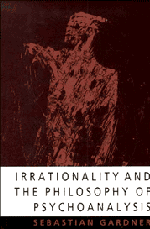Book contents
- Frontmatter
- Contents
- Acknowledgements
- Note on the text
- Introduction
- PART I DIVIDING PERSONS
- PART II PSYCHOANALYTIC CONCEPTS
- PART III PSYCHOANALYTIC CONCEPTION OF MIND
- 7 Metapsychology and psychoanalytic personality
- 8 Consciousness, theory and epistemology
- Appendices
- Notes
- Works of Freud cited
- Bibliography
- Index
8 - Consciousness, theory and epistemology
Published online by Cambridge University Press: 21 October 2009
- Frontmatter
- Contents
- Acknowledgements
- Note on the text
- Introduction
- PART I DIVIDING PERSONS
- PART II PSYCHOANALYTIC CONCEPTS
- PART III PSYCHOANALYTIC CONCEPTION OF MIND
- 7 Metapsychology and psychoanalytic personality
- 8 Consciousness, theory and epistemology
- Appendices
- Notes
- Works of Freud cited
- Bibliography
- Index
Summary
the mind
Acquired transparence and beheld itself
And beheld the source from which transparence came
Wallace Stevensas he had no theory, and no coat on, he was
unanimously set at nought.
DickensCONSCIOUSNESS AND UNCONSCIOUS MENTALITY
This chapter begins with a question so central that it may seem as if it ought to have been considered at the outset of this enquiry: Is the concept of unconscious mentality coherent? After all, if unconscious mentality is a contradictory concept, then the whole question of psychoanalytic explanation is dramatically cut short.
There are two views of the relation of consciousness to mentality. The one, which may as well be called Cartesian, says that mentality and consciousness are equivalent; or, in a more extended formulation, that there is no coherent concept of unconscious mentality other than of dispositions to states of consciousness. The other, Noncartesian view – which is clearly required for psychoanalytic theory – is, of course, that there are or could be unconscious mental states; or, that unconscious mentality need not reduce to dispositions to states of consciousness. My suggestion will be that, without going into this (potentially abstruse) issue far enough for it to be completely resolved, it can be concluded that there is no a priori obstacle to an extension of ordinary psychology profoundly dependent on the notion of unconscious mentality, and that such is justified if demanded by considerations of explanation.
- Type
- Chapter
- Information
- Irrationality and the Philosophy of Psychoanalysis , pp. 207 - 243Publisher: Cambridge University PressPrint publication year: 1993



